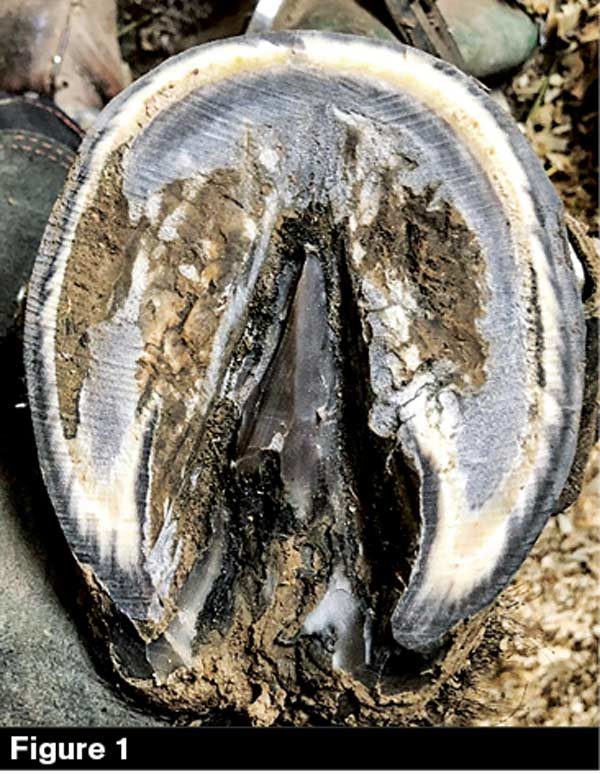Canker in horses refers to a bacterial infection that affects the tissues of the hoof. The infection typically leads to an abnormal growth of tissue and can cause lameness and discomfort in the affected horse.
Canker is characterized by a foul odor, a soft and spongy texture, and a white or gray discharge. It is a relatively rare condition, but can be challenging to treat and may require long-term management. Proper hoof care and regular veterinary attention are important in preventing and managing canker in horses.
Veterinarians may recommend a combination of topical medications, cleanings, and bandaging to address the infection and promote healing.

Credit: www.irongateequine.com
Understanding Canker In Horses
Understanding Canker in Horses
Definition of canker in horses: Canker in horses is a chronic and progressive degenerative condition that primarily affects the hoof. It is characterized by the development of a soft, moist, and foul-smelling tissue, known as “canker tissue,” which invades the inner layers of the hoof.
Incidence and prevalence of canker in horses: Canker is considered a relatively rare condition in horses. However, its exact incidence and prevalence are difficult to determine, as it is often misdiagnosed or goes unreported. Canker can occur in horses of any age, breed, or gender.
Causes and risk factors of canker in horses: The exact causes of canker in horses are still not fully understood. However, it is believed to be associated with a combination of factors, including poor hoof hygiene, prolonged exposure to wet and muddy conditions, compromised immune system, genetic predisposition, and concurrent hoof diseases or injuries.
Recognizing Canker In Horses
Canker in horses is a rare but serious hoof condition that can cause lameness and discomfort. Recognizing the signs and symptoms of canker is crucial for early diagnosis and treatment. Some common signs of canker include persistent foul odor, excessive and rapid hoof growth, a soft, spongy mass on the sole of the hoof, and bleeding or oozing from the affected area.
Diagnostic tests, such as hoof scraping and bacterial culture, can confirm the presence of canker. However, it’s important to rule out other hoof conditions through differential diagnosis, such as thrush or white line disease, which may have similar symptoms. If you suspect canker in your horse, consult a veterinarian for proper evaluation and treatment.
Signs And Symptoms Of Canker In Horses
- Persistent foul odor
- Excessive and rapid hoof growth
- Soft, spongy mass on the sole of the hoof
- Bleeding or oozing from the affected area
Diagnostic Tests For Canker In Horses
- Hoof scraping
- Bacterial culture
Differential Diagnosis For Canker In Horses
Other hoof conditions with similar symptoms, such as thrush or white line disease, should be ruled out through differential diagnosis.
Managing Canker In Horses
Canker is a serious hoof condition that affects horses, causing pain and lameness. Managing canker in horses is crucial to ensure the well-being of these animals. Treatment options for canker in horses include medical treatment and surgical treatment.
Treatment Options For Canker In Horses
Medical treatment: To combat canker in horses, veterinarians may prescribe medications, such as antibiotics and anti-inflammatory drugs. Topical treatments, like antimicrobial solutions, can be applied to the affected area to reduce infection and promote healing.
Surgical treatment: In severe cases, surgical intervention may be necessary. This can involve removing the affected tissue and applying specialized dressings to aid in healing. It is essential to consult with a veterinarian to determine the best course of action based on the severity of the canker.
Preventive measures for canker in horses include proper hoof care and maintenance. Regular trimming and cleaning of hooves can help prevent the development of canker. Additionally, avoiding risk factors, such as exposure to damp and unsanitary conditions, can reduce the chances of horses contracting canker.
Frequently Asked Questions On What Is Canker In Horses
What Are The Symptoms Of Canker In Horses?
The symptoms of canker in horses include a foul odor, a sticky discharge, and the presence of small, grayish-white lumps in the hoof. In severe cases, horses may also experience lameness and difficulty walking. If you notice any of these symptoms in your horse, it’s important to consult with a veterinarian for proper diagnosis and treatment.
How Is Canker In Horses Diagnosed?
Canker in horses is diagnosed based on the appearance of the hoof and the clinical signs exhibited by the horse. A veterinarian will perform a thorough examination of the affected hoof and may take tissue samples for laboratory analysis. In some cases, radiographs may be taken to assess the extent of the infection.
It’s important to consult with a veterinarian for an accurate diagnosis.
What Causes Canker In Horses?
Canker in horses is caused by a bacterial infection, usually in the sulci of the frog of the hoof. The exact cause is unknown, but factors such as poor hoof hygiene, trapped moisture, and compromised immune systems can contribute to the development of canker.
Horses with canker should be isolated to prevent the spread of infection and treated promptly.
How Is Canker In Horses Treated?
Treatment for canker in horses typically involves a combination of topical medications, frequent hoof cleanings, and proper hoof care. The infected tissue may need to be removed or debrided, and antimicrobial agents are often used to combat the bacterial infection.
In severe cases, surgical intervention may be necessary. It’s important to work closely with a veterinarian for an appropriate treatment plan.
Conclusion
Canker in horses is a bothersome condition that requires prompt attention and proper treatment. By recognizing the symptoms and causes, horse owners can take proactive measures to prevent the development of canker and ensure their horse’s well-being. Regular hoof care, a balanced diet, and a clean and hygienic environment are key in preventing canker.
Remember, early detection and intervention are crucial when it comes to managing canker effectively and preventing further complications. Take the necessary steps to keep your horse healthy and happy.

